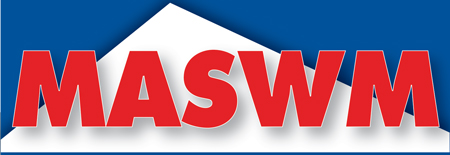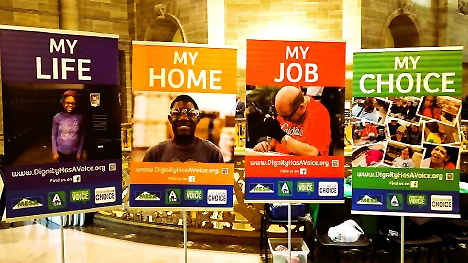
Members | About Workshops | Services for Missourians | News
Dignified and meaningful employment
for people with disabilities
A Call for an Open Discussion on Employment for Individuals with Disabilities
(This article was written by MASWM Legislative Chair and Project CU Executive Director Kit Brewer.) An Opportunity to Revisit Strategies
An Opportunity to Revisit Strategies
In light of the recent election, now is the perfect time to refocus our conversations regarding employment for the disability community. Frequently that community is thought and spoken of as a single group, speaking with a single voice, facing similar barriers, and striving to reach similar goals. As with most things, spoken at an overarching and generalize level, that can be made to ring true, but the devil is always in the details.
In the United States more than one in four individuals, 28.7%, has a disability. That’s more than 99 million individuals. It won’t surprise you to learn that not everyone is the same. They don’t have the same kind or level of disability diagnosis. They don’t all want the same types of jobs. They don’t have the same level of social, physical or intellectual abilities, nor to they share the same goals and face the same barriers. They are made up of the same diverse socioeconomic, cultural, racial, and regional differences as the rest of the population, and have just as many differing dreams, goals, and aspirations.
Why then, would we try to pigeonhole such a diverse effort as disability employment into a single pathway, or to limit any from forging or selecting a pathway of their own?
The reason that now is the time for a restart for this conversation is simple. We are facing as the result of the election a significant swing in ideology and with it the priority and focus for a broad range of policy and services. This is not uncommon. The depth and breadth of those changes may vary, but the cycle of elections and resulting changes is a constant. It behooves all of us, then to commit to a more thorough examination of problems and more diligent finding of solutions.
There are Positive Trends
In 2023 the unemployment rate in the U.S. was 3.5% while unemployment for individuals with disabilities was 7.2%, Since 2012 unemployment rates for both groups have lessened sharply from 8.1% and 15.0% respectively.
During that timeframe the overall disability unemployment rate dropped even more sharply than the national average. This speaks positively to a variety of economic factors, shifts in industry and technology, policy successes, and includes a positive cultural shift toward inclusion.
But There Are Other Considerations
The data may also suggest to the casual viewer an unclear and unfairly optimistic view of the state of employment for individuals with disabilities. The pathways to success are not as open to all and some wish to limit them even further. The definition of disability covers a wide list of diagnosis from diabetes and cancer to gastro-intestinal conditions to physical conditions both at birth and occurring later in life to autism, intellectual, and mental health and many in between. Of the 99 million individuals in the U.S. with a disability about 8.4 million have Intellectual and Developmental Disabilities (I/DD). About 15% of them, 1.2 million people, are listed with a moderate, severe, or profound intellectual disability.
During that same timeframe unemployment rates for individuals with I/DD have risen from 16.3% to 17.0% even spiking during the pandemic at 17.7% in 2020.
I/DD, particularly when at the most significant levels of diagnosis, presents difficult challenges to many traditional employers. Often additional supervision is required, and supervisors may require specialized training and skill levels.
The data speaks to the great diversity of the disability community itself. It also speaks to gaps in the traditional employment model to accommodate that full diversity.
Flexibility and Options are Crucial
Currently many individuals with significant I/DD, Autism Spectrum Disorder (ASD), or some mental health diagnosis choose different pathways to wage earning and an employment experience including self-employment, volunteering, internships, vocational training, and facility-based settings. These options along with customization by employers and job coaching from providers currently provide for a large menu space of options allowing multiple pathways to success.
Debate continues to exist and many attempt to assign a hierarchy or preference level to this list. Such attempts often blur or omit the full number of options from those individuals and families most in need of accurate information to make an informed choice. Funders, state and federal regulators, and providers must be held accountable in maximizing, not lessening these opportunities.
Multiple Barriers Can Hamper Success
Other factors beyond the choice of employment factor into both unemployment and underemployment for individuals with disabilities. There are multiple federal, state, and local programs and funding designed or available to benefit individuals with disabilities. Navigating the eligibility requirements and limitations to these programs is quite challenging. There is little to no consistency in the guidelines between programs, and wage and savings limitations can easily limit or negate eligibility.
Conversation and debate have begun to lead to changes in these programs and their eligibility and limitations, but the work is far from over and great changes are still needed. Wage and savings limitations to these programs, particularly at the federal level are among the most limiting factors to employment for individuals with disabilities and others receiving benefits. Imagine the frustration of turning down job growth and advancement for fear of losing some or all the specialized supports needed for success.
Benefits, Wages, Insurance, Transportation, Inclusion, Staffing and Supports, Program Availability, Waiting Lists, and Funding are just some of the many barriers facing individuals with disabilities daily. Most, if not all, effect each of us as well. Disability concerns are simply human concerns.
Be the Solution
If the terms or their nuanced definitions are unfamiliar, if the barriers or debates are unknown to you, I ask you to research and engage. If they are familiar, I ask you to forgo the siloed and one-dimensional thinking and engage together. We must create on open discussion toward best practices and the creation of meaningful and realistic solutions.
Kit Brewer is the Executive Director of Project CU, Inc. in St. Louis, MO and the parent of a 25-year-old child on the Autism Spectrum. He also serves as the Vice President of The Coalition for Employment Choice, and sits on the MASWM Board of Directors, serving as the Legislative Chair, He has been involved in Non-Profit Administration and Social Entrepreneurial Business for more than 20 years.